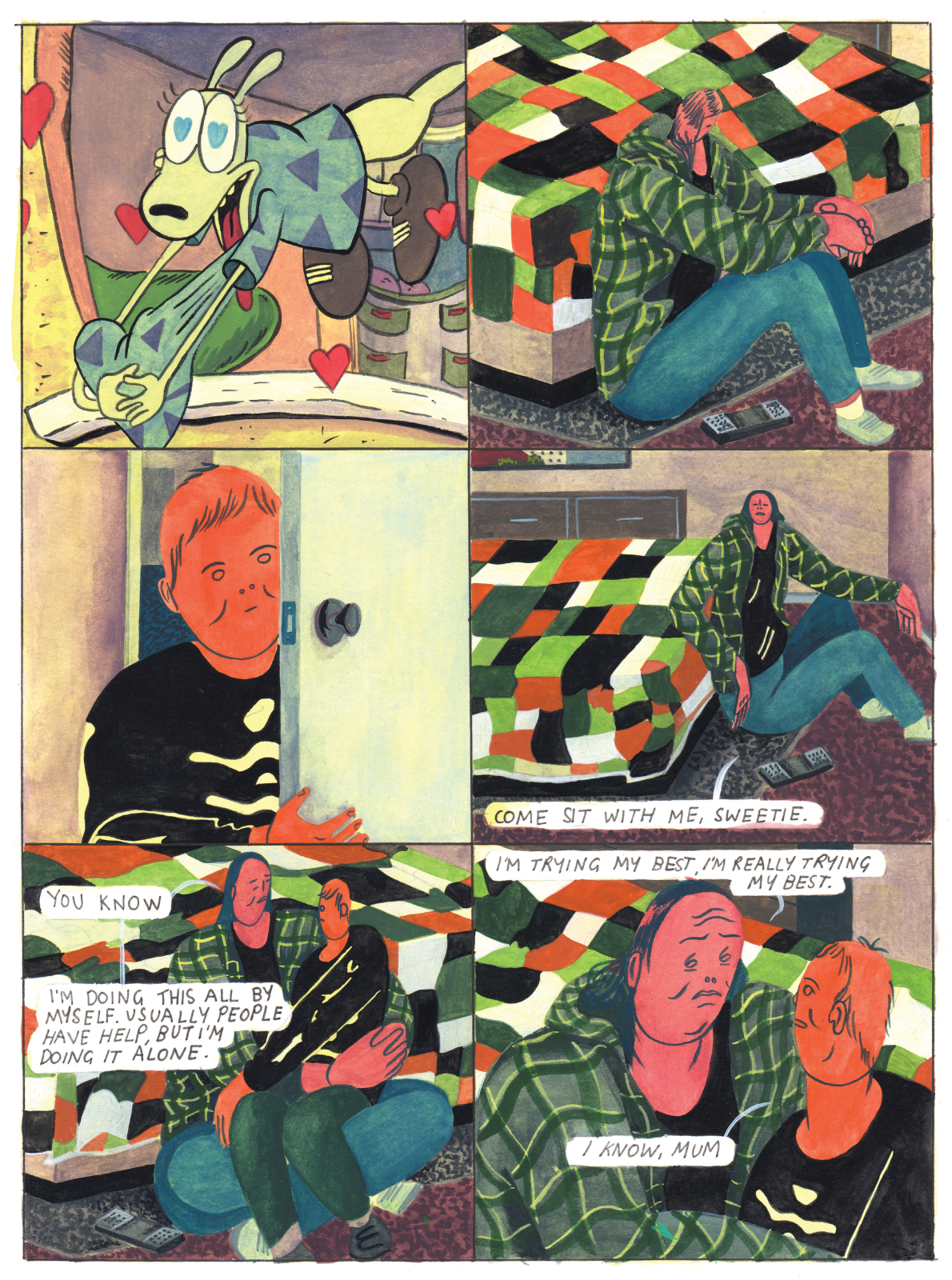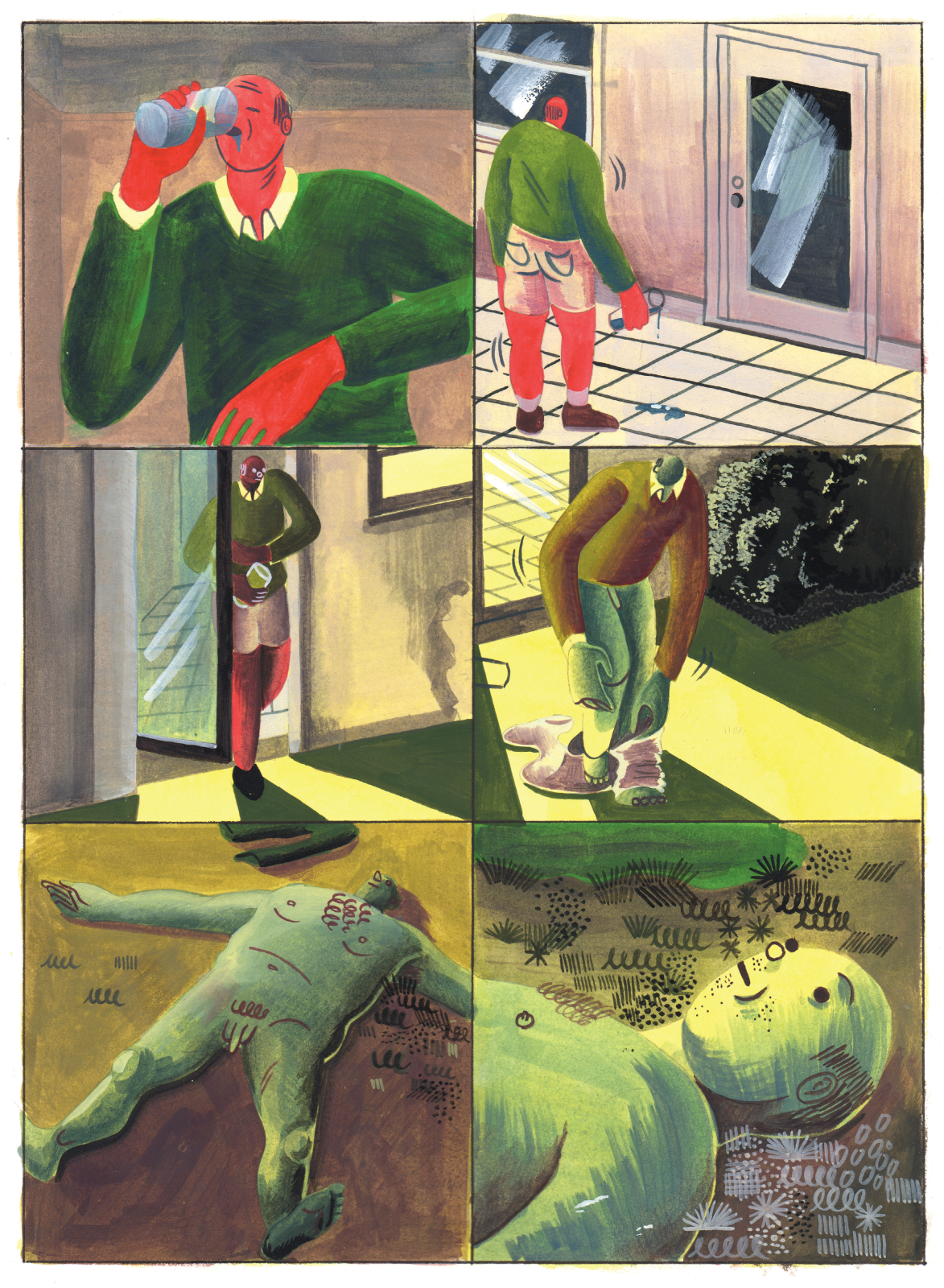There aren’t any trustworthy men in Men I Trust, which may lead some to wonder whether the title of Tommi Parrish’s colorful rumination on modern queer relationships is playful, sardonic, or simply esoteric. Perhaps it is all three.
Within these pages you will find a thoughtful and specific treatise on the ways people find one another adrift in their own milieu of past experience, current situations, trauma and desire - and how those factors bleed into one another, manifesting in real world attempts at meaningful connection. The heart of the narrative concerns Eliza, a single mother struggling to find time for her poetry writing and performances who crosses paths with Sasha, a slightly younger woman who is a fan of Eliza’s art. The pair strike up a burgeoning friendship, and maybe something more.
The book’s straightforward dialogue provides a spine of clarity to a narrative long-limbed with ambiguity. The characters' emotional quality is often messy—at times depressing—as they work their way through their lives such as they are, day in and day out. The constantly changing state of their emotions lends a feeling of real world complexity to figures rendered in Parrish’s distinctive style. Their soft, rounded bodies, enlarged limbs and small, ovoid heads with few defining facial features sometimes require a double-take to know who is who. The somewhat surreal human forms emphasize people’s underlying similarities in contrast to societal insistence upon supposed differences. Bodies are more alike than not in this world, as in our own. More individuated are people’s thoughts and feelings as they’re impinged upon by factors of living within their particular fleshy vessels.
As Eliza struggles to get through the various commitments her life requires—caring for her son, work, sobriety—little to no time is left for her to be alone with her thoughts, the wellspring from which her art flows. In order for her to carve out even a few minutes in which to generate new work or give a reading, innumerous tasks must first be completed: several work shifts at the butcher shop; prepping her son for school; dealing with her less-than-dedicated co-parent; and simply making food. Sometimes she is unable to focus on her art for several days - and when she does, it sometimes comes at the expense of another commitment to herself or others.
In contrast, Sasha has too much time to herself after moving back in with her parents, and is unburdened by children or money woes. She dabbles in sex work at her own pace, leaving large swaths of time open for her to do as she pleases. Yet the space available from the absence of structure in her life is filled up by feelings of anxiety. An almost obsessive need to form a meaningful connection with another person dovetails with Sasha's severe concern over how others perceive her.
Every page in this book is a tightly-packed colorful vision. The painted panels, most often six to a page, are arranged right up against each other without any gutters. There is a sly depth to each one. The focus is often on a face or character, but the scene around them is beautifully rendered in ways that extend the moment further down the block, deeper into the café, apartment, hotel room or bar.
Even when there is an extended series of talking heads, Parrish does well to swivel perspective and show us different details surrounding their characters. We see street corners edged in snow, close-ups of sneakers and wine bottles, a world of solid brick and glass buildings and three-dimensionality. At different times throughout, we are treated to interstitial moments: a page of a faintly-drawn Garfield cartoon awash in a yellow background, after Eliza drifts to sleep with her son. A tree backlit by white stars and a blue night sky causes a certain mid-story reverie. These moments slow the narrative for a beat or two, allowing time to reflect. There is no forewarning about what will come next. We know less than the characters in each moment we’re with them. The effect is that we are riding shotgun with them as they maneuver through situations, and we are just as present when they fuck up. We are with them still when they inevitably pick themselves back up and continue on.
One of the stronger sequences in the book shows Eliza chatting and smoking with a member of her support group, then realizing she’s late to pick up her son from aftercare. When she arrives, he is angry and sullen. He misbehaves on their bus ride home, and then throws a tantrum when Eliza prepares his dinner, trying to talk rationally to him about his emotional outbursts. He hits her in the face and refuses to eat his dinner, which is the final straw for Eliza, who vents her anger back on him before storming off to her room. Before the night is done, Justin calmly eats his meal alone, puts his dishes away, and enters his mother’s room to comfort her and apologize. The next morning they start fresh, as parents and children do.
Another effect of the audience's inferior position is Parrish’s ability to shift our perspective of a character relative to their behavior in a given moment. When we first meet Sasha’s mother, she’s a little tipsy from drinking wine at home. She oscillates between cooing over Sasha and harping on her for the careless way she forgets to remove her shoes as she comes into the den. The result is less than sympathetic, and it’s easy to side with Sasha in that situation. Later on, we get more detail about the stress and worry Sasha has caused her parents, thus recalibrating the empathy somewhat.
There is one character who remains at the fringes of the story until the climax, whose behavior goes from bad to worse. Andrew is a TV-famous home remodeler and client of Sasha’s. When we first meet him, he is drinking at a bar and talking to himself about his bitterness towards women while texting Sasha for nudes. He drives home drunk and passes out in his backyard. Later we see him on TV defending his renovation projects while glossing over the community displacement his rebuilds cause, with zero empathy for those who are negatively impacted by his work. Such uncomplicated self-importance is real enough, and demonstrates how an oblivious or uncaring perspective can make people impervious to complicated emotional situations. Like his relationship with Sasha, every moment with Andrew carries a tinge of the transactional. His behavior is less malicious than it is selfish; he is always after something for himself before all other concerns.
How do people connect in a world of non-stop interruptions? How does one tally the ongoing series of behaviors an individual engages in that makes up who they are? Men I Trust shows us how something as simple as mutual desire is complicated by outside factors and internal ones affecting our ability to meet each other where we are.










